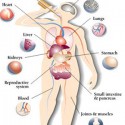The AbuseCheck Hair Alcohol Test
From a Small Sample of Hair, This Test Can Distinguish Non-Drinkers from Moderate and Abusive Drinkers
Alcoholism poses serious health issues with major socio-economic consequences to society. Four major areas of concern are public transportation, child custody rights, measuring underage drinking, and tools for monitoring rehabilitation. The Omnibus Transportation Employee Testing Act of 1991 requires drug and alcohol testing of safety-sensitive transportation employees in aviation, trucking, railroads, mass transit, pipelines and other transportation industries. Monies paid to courts for child custody or divorce cases that stem from alcohol use could be significantly decreased if long term alcohol use could be reliably established. A historical alcohol consumption test could also be helpful in optimizing rehabilitation treatment programs and monitoring repeat “driving under the influence” (DUI) offenders. Current testing methods such as breath, blood, or urine, can be more invasive, and provide alcohol use information for a window of only a few hours after alcohol consumption. These tests do not provide quantitative long term information.
Consumer Genetics’ new AbuseCheck Hair Alcohol Test provides an extended history of alcohol consumption. The test measures levels of fatty acid ethyl esters (FAEEs) in the hair. FAEEs are byproducts of alcohol metabolism created by the body. As these molecules circulate in the blood, they are incorporated into the structure of growing hair. The more alcohol which has been consumed the higher the levels of FAEEs in the hair during that period of time. Dr. Chinh Bach, CEO of Consumer Genetics, states, “The longer the hair used for the test, the more history of alcohol consumption which can be ascertained. It is reliable, accurate, and there is no chance of false positives. This is revolutionary.”
Extensive studies on FAEE testing, involving over 1000 participants, have been carried out since the year 2000. These have enabled researchers to establish a reliable reference range for FAEEs with respect to drinking habits of the various groups — non-drinkers, social drinkers and excessive drinkers.
Alcohol abuse is a problem for many corporations, especially those where people are responsible for transporting cargo or passengers, such as airlines and buses, where alcohol related accidents can injure multiple people. Monitoring employees for their recent history of alcohol consumption can lead to safer global transportation systems and a more productive workplace. The AbuseCheck test can monitor months of past alcohol consumption, accurately distinguishing between non-drinkers, drinkers and excessive drinkers.
The benefits of proving or disproving alcohol abuse extend into the medical arena. For William Holowaychuk, AbuseCheck may help save his life. Mr. Holowaychuk was taken off the liver transplant list due to a history of alcohol abuse. However, according to Mr. Holowaychuk, the Canadian Health Ministry said if he could prove that he had not recently been abusing alcohol he could get back on the list in a higher priority. His AbuseCheck test results indicated that he had not been abusing alcohol. Mr. Holowaychuk proclaimed, “If I hadn’t found the test, I would have gone back to the beginning of the wait list…”
Typical scenarios for using the Hair Alcohol Test:
1) Parents can now determine if their children have chronic alcohol problems.
2) Child custody cases can use definitive means to determine alcohol abuse or non-abuse.
3) Chronic alcohol abuse among transportation employees can now be monitored.
4) Rehabilitation programs can monitor their members’ progress during and after completing the program.
5) Those needing to prove that they have not been recently abusing alcohol for health, domestic or employment purposes now have a solution.
____________________
source: Market Watch

